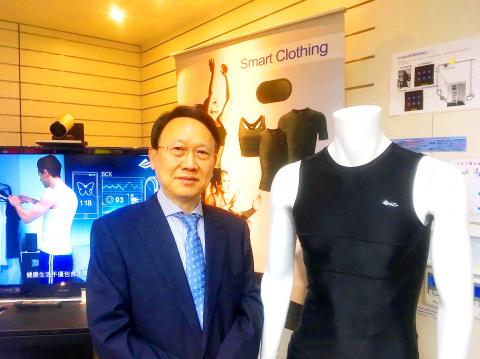Apparel maker Makalot Industrial Co (聚陽) is expanding capacity in Africa and Central America to reach more brand customers, a company executive said yesterday.
“This year, we plan to outsource manufacturing to Lesotho through collaboration with some manufacturers there,” chairman Frank Chou (周理平) told a news conference in Taipei.
The company is also considering setting up its own plants in Africa, Chou said, adding that it would send a team to the continent to evaluate the possibility of further expanding its presence there.

Photo: Chen Jou-chen, Taipei Times
Makalot expects to secure more orders from US clients through the expansion project, he said, citing lower labor costs and possibly zero tariffs due to some African nations’ trade agreements with the US.
The plan to build a manufacturing base in Africa is also expected to attract European clients, given lower transportation costs compared with Southeast Asian nations, Makalot said.
Makalot operates plants in Taiwan, China, Indonesia, Cambodia, Vietnam and the Philippines, company data showed.
The company, which manufactures products for Gap Inc, Kohl’s Corp and Target Corp, is also tapping markets in Central America to further strengthen its position in the supply chain of US apparel brands.
The firm said it would begin manufacturing products in Guatemala in the fourth quarter of this year at the earliest.
Makalot gave a relatively positive business outlook for this year, saying it expects the local currency’s fluctuations to have less impact on its operations.
Volatile foreign exchange rates remain a risk to the company, but the appreciation of the New Taiwan dollar should not be as drastic as last year, Chou said.
The NT dollar last year rose 8.14 percent against the US dollar, putting significant pressure on Taiwan’s export-reliant manufacturers.
Makalot posted revenue of US$736 million for last year, representing a 7 percent year-on-year increase.
However, in NT dollar terms, full-year sales only gained 1.12 percent to NT$22.38 billion (US$763.35 million), company data showed.
Makalot used the news conference to showcase its latest smartwear products featuring graphene applications, which are expected to drive sales growth and sustain its profitability for the next few years.
The company has been working on the product with Singular Wings Medical Co (奇翼醫電), a Hsinchu-based healthcare solution provider, for more than two years, it said.
Graphene, a material with better biocompatibility, can help devices detect and track the electrical activity of wearers’ hearts more accurately, Singular president David Lee (李維中) said on the sidelines of the gathering.
Makalot is ready for commercial production, a company official told the Taipei Times, but declined to provide a timetable.
The company said it plans to spend about NT$100 million on the research and development of smartwear-related projects this year.

Greek tourism student Katerina quit within a month of starting work at a five-star hotel in Halkidiki, one of the country’s top destinations, because she said conditions were so dire. Beyond the bad pay, the 22-year-old said that her working and living conditions were “miserable and unacceptable.” Millions holiday in Greece every year, but its vital tourism industry is finding it harder and harder to recruit Greeks to look after them. “I was asked to work in any department of the hotel where there was a need, from service to cleaning,” said Katerina, a tourism and marketing student, who would

i Gasoline and diesel prices at fuel stations are this week to rise NT$0.1 per liter, as tensions in the Middle East pushed crude oil prices higher last week, CPC Corp, Taiwan (台灣中油) and Formosa Petrochemical Corp (台塑石化) said yesterday. International crude oil prices last week rose for the third consecutive week due to an escalating conflict between Israel and Iran, as the market is concerned that the situation in the Middle East might affect crude oil supply, CPC and Formosa said in separate statements. Front-month Brent crude oil futures — the international oil benchmark — rose 3.75 percent to settle at US$77.01

Merida Industry Co (美利達) has seen signs of recovery in the US and European markets this year, as customers are gradually depleting their inventories, the bicycle maker told shareholders yesterday. Given robust growth in new orders at its Taiwanese factory, coupled with its subsidiaries’ improving performance, Merida said it remains confident about the bicycle market’s prospects and expects steady growth in its core business this year. CAUTION ON CHINA However, the company must handle the Chinese market with great caution, as sales of road bikes there have declined significantly, affecting its revenue and profitability, Merida said in a statement, adding that it would

UNCERTAINTIES: The world’s biggest chip packager and tester is closely monitoring the US’ tariff policy before making any capacity adjustments, a company official said ASE Technology Holding Inc (日月光投控), the world’s biggest chip packager and tester, yesterday said it is cautiously evaluating new advanced packaging capacity expansion in the US in response to customers’ requests amid uncertainties about the US’ tariff policy. Compared with its semiconductor peers, ASE has been relatively prudent about building new capacity in the US. However, the company is adjusting its global manufacturing footprint expansion after US President Donald Trump announced “reciprocal” tariffs in April, and new import duties targeting semiconductors and other items that are vital to national security. ASE subsidiary Siliconware Precision Industries Co (SPIL, 矽品精密) is participating in Nvidia